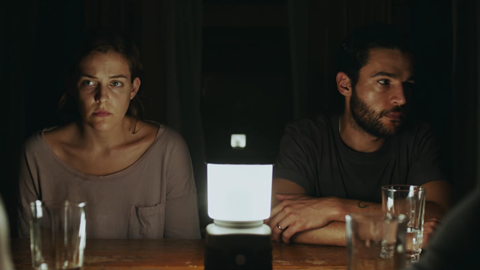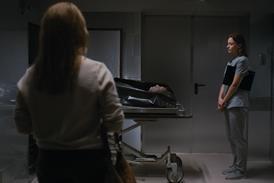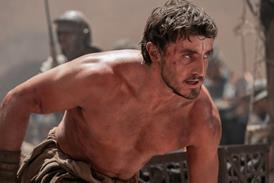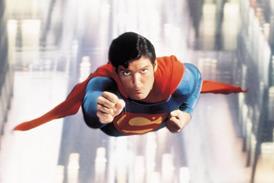The director of Krisha returns with a powerful, tense, post-apocalyptic chamber horror

Dir/scr: Trey Edward Shults. US. 2017. 91mins
The tension is beautifully modulated and powerfully deployed in It Comes At Night, the expert sophomore feature from Krisha writer-director Trey Edward Shults. Though drawing from familiar tenets of the post-apocalyptic thriller, this quietly unsettling chamber drama goes its own way, touching on plenty of potent themes without ever settling on one simple metaphor as horror descends on the characters. Shults has once again made a movie about the terror of family, but It Comes At Night’s confident, ruthless craftsmanship suggests a filmmaker only starting to reach his potential.
Largely avoiding shock cuts or other horror-movie gimmicks, It Comes At Night crafts its suspense from a slow build-up
Opening June 9 in the US, this A24 release should do robust art-house business, especially with Joel Edgerton lending some commercial clout. Discriminating horror fans should come out in droves, and strong reviews will further stoke audience curiosity, perhaps resulting in grosses comparable to A24’s The Witch ($40m worldwide).
It Comes At Night thrusts us into a near-future in which some unnamed contagious plague has devastated humanity. Stoic Paul (Edgerton), his wife Sarah (Carmen Ejogo) and their teen son Travis (Kelvin Harrison, Jr.) live in a barricaded house in the middle of the woods, always on high-alert for any infected people who might try to break down the door. One day, they’re visited by Will (Christopher Abbott), who isn’t sick but is desperate to find lodging for his healthy wife Kim (Riley Keough) and their boy Andrew (Griffin Robert Faulkner). Reluctantly, Paul decides to let them live with his family.
From that setup, most viewers will understandably begin speculating on how innocent these outsiders really are — and how their arrival will upset the equilibrium within this boarded-up home. It’s practically a given in the zombie/post-apocalyptic genre that, for the survivors, the dread provoked by the monsters outside the walls is almost as strong as the distrust and uncertainty that escalates between those left alive.
Shults plays with these expectations, occasionally leading to predictable plot points. But just as Krisha dwelled in a familiar genre — that of the family drama — while bringing fresh intensity through a focus on the characters’ psychological makeup, It Comes At Night tweaks narrative conventions to tell a resonant story about suspicion, family, patriarchy, sexual desire and guilt. Other movies superficially resemble It Comes At Night, but whether it’s Kris Fenske’s elaborate, ominous sound design or Krisha cinematographer Drew Daniels’ immaculately moody low-light photography, few of its peers are as elemental in their oppressive unease.
Largely avoiding shock cuts or other horror-movie gimmicks, It Comes At Night crafts its suspense from a slow build-up, Shults taking time to establish the characters just enough so that we get a vague sense of them — which makes it that much easier for the filmmaker to surprise us with their actions or leave us wondering what they’re not revealing to each other.
Flexing a rugged masculinity, Edgerton plays Paul as the quintessential protective father, his spooked eyes a by-product of the horrors he’s seen. Paul’s initial resistance to helping Will is born from his vigilance to safeguard his family, but once he allows them into his home, he wrestles with trust issues — not to mention a passing concern that his wife and son don’t need him as much now that they have other people in their life. Of course, such a taciturn man never expresses these feelings, but Edgerton’s precise, muted performance telegraphs the character’s shifting emotions.
The entire ensemble echoes Edgerton’s teasingly opaque turn. Abbott’s edginess could suggest either deceitfulness or apprehension, making it impossible to know Will’s exact motivations: Is he seeking sanctuary or does he have something more sinister in mind?
While the female leads are uniformly strong, It Comes At Night zooms in on the men, taking special note of Harrison. He’s terrific as an unsteady teen discombobulated by their dire circumstances but, also, by the grief he feels for his recently-dead grandfather, whom Paul had to eliminate because he showed symptoms of the lethal disease.
It’s through Travis’s perspective that we see the film’s power dynamics fluctuate, resulting in uncomfortable moral questions and tense split-second decisions, and the young actor communicates each moment of rippling unease with immediacy. In this claustrophobic setting, Travis is haunted by nightmares but, in one form or another, all the characters are infected by a fear they can’t shake.
Production company: Animal Kingdom
US distribution: A24, www.a24films.com
International sales: Visit Films, info@visitfilms.com
Producers: David Kaplan, Andrea Roa
Executive producer: Joel Edgerton
Cinematography: Drew Daniels
Production design: Karen Murphy
Editors: Trey Edward Shults & Matthew Hannam
Music: Brian McOmber
Website: www.itcomesatnight.com
Main Cast: Joel Edgerton, Christopher Abbott, Carmen Ejogo, Kelvin Harrison, Jr., David Pendleton, Griffin Robert Faulkner, Riley Keough
























